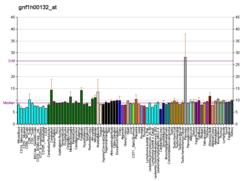Eukaryotic elongation factor-2 kinase (eEF-2 kinase or eEF-2K), also known as calmodulin-dependent protein kinase III (CAMKIII) and calcium/calmodulin-dependent eukaryotic elongation factor 2 kinase,[5] is an enzyme that in humans is encoded by the EEF2K gene.[6][7]
Function
editeEF-2 kinase is a highly conserved protein kinase in the calmodulin-mediated signaling pathway that links multiple up-stream signals to the regulation of protein synthesis. It phosphorylates eukaryotic elongation factor 2 (EEF2) and thus inhibits the EEF2 function.[6][8]
Activation
editThe activity of eEF-2K is dependent on calcium and calmodulin. Activation of eEF-2K proceeds by a sequential two-step mechanism. First, calcium-calmodulin binds with high affinity to activate the kinase domain, triggering rapid autophosphorylation of Thr-348.[9][10] In the second step, autophosphorylation of Thr-348 leads to a conformational change in the kinase likely supported by the binding of phospho-Thr-348 to an allosteric phosphate binding pocket in the kinase domain. This increases the activity of eEF-2K against its substrate, elongation factor 2.[10]
eEF-2K can gain calcium-independent activity through autophosphorylation of Ser-500. However, calmodulin must remain bound to the enzyme for its activity to be sustained.[9]
Clinical significance
editThe activity of this kinase is increased in many cancers and may be a valid target for anti-cancer treatment.[6][11]
It is also suggested that eEF-2K may play a role the rapid anti-depressant effects of ketamine through its regulation of neuronal protein synthesis.[12]
Cancer
editeEF-2K expression is often upregulated in cancer cells, including breast and pancreatic cancers and promotes cell proliferation, survival, motility/migration, invasion and tumorigenesis.[13][14]
References
editFurther reading
edit- Nairn AC, Palfrey HC (Dec 1987). "Identification of the major Mr 100,000 substrate for calmodulin-dependent protein kinase III in mammalian cells as elongation factor-2". The Journal of Biological Chemistry. 262 (36): 17299–303. doi:10.1016/S0021-9258(18)45377-X. PMID 3693353.
- Redpath NT, Price NT, Severinov KV, Proud CG (Apr 1993). "Regulation of elongation factor-2 by multisite phosphorylation". European Journal of Biochemistry. 213 (2): 689–99. doi:10.1111/j.1432-1033.1993.tb17809.x. PMID 8386634.
- Pavur KS, Petrov AN, Ryazanov AG (Oct 2000). "Mapping the functional domains of elongation factor-2 kinase". Biochemistry. 39 (40): 12216–24. doi:10.1021/bi0007270. PMID 11015200.
- Diggle TA, Subkhankulova T, Lilley KS, Shikotra N, Willis AE, Redpath NT (Feb 2001). "Phosphorylation of elongation factor-2 kinase on serine 499 by cAMP-dependent protein kinase induces Ca2+/calmodulin-independent activity". The Biochemical Journal. 353 (Pt 3): 621–6. doi:10.1042/0264-6021:3530621. PMC 1221608. PMID 11171059.
- Knebel A, Morrice N, Cohen P (Aug 2001). "A novel method to identify protein kinase substrates: eEF2 kinase is phosphorylated and inhibited by SAPK4/p38delta". The EMBO Journal. 20 (16): 4360–9. doi:10.1093/emboj/20.16.4360. PMC 125581. PMID 11500363.
- Wang X, Li W, Williams M, Terada N, Alessi DR, Proud CG (Aug 2001). "Regulation of elongation factor 2 kinase by p90(RSK1) and p70 S6 kinase". The EMBO Journal. 20 (16): 4370–9. doi:10.1093/emboj/20.16.4370. PMC 125559. PMID 11500364.
- Arora S, Yang JM, Craft J, Hait W (May 2002). "Detection of anti-elongation factor 2 kinase (calmodulin-dependent protein kinase III) antibodies in patients with systemic lupus erythematosus". Biochemical and Biophysical Research Communications. 293 (3): 1073–6. doi:10.1016/S0006-291X(02)00324-8. PMID 12051769.
- Wistow G, Bernstein SL, Wyatt MK, Fariss RN, Behal A, Touchman JW, Bouffard G, Smith D, Peterson K (Jun 2002). "Expressed sequence tag analysis of human RPE/choroid for the NEIBank Project: over 6000 non-redundant transcripts, novel genes and splice variants". Molecular Vision. 8: 205–20. PMID 12107410.
- Knebel A, Haydon CE, Morrice N, Cohen P (Oct 2002). "Stress-induced regulation of eukaryotic elongation factor 2 kinase by SB 203580-sensitive and -insensitive pathways". The Biochemical Journal. 367 (Pt 2): 525–32. doi:10.1042/BJ20020916. PMC 1222910. PMID 12171600.
- Browne GJ, Finn SG, Proud CG (Mar 2004). "Stimulation of the AMP-activated protein kinase leads to activation of eukaryotic elongation factor 2 kinase and to its phosphorylation at a novel site, serine 398". The Journal of Biological Chemistry. 279 (13): 12220–31. doi:10.1074/jbc.M309773200. PMID 14709557.
- Browne GJ, Proud CG (Apr 2004). "A novel mTOR-regulated phosphorylation site in elongation factor 2 kinase modulates the activity of the kinase and its binding to calmodulin". Molecular and Cellular Biology. 24 (7): 2986–97. doi:10.1128/MCB.24.7.2986-2997.2004. PMC 371112. PMID 15024086.
- Brill LM, Salomon AR, Ficarro SB, Mukherji M, Stettler-Gill M, Peters EC (May 2004). "Robust phosphoproteomic profiling of tyrosine phosphorylation sites from human T cells using immobilized metal affinity chromatography and tandem mass spectrometry". Analytical Chemistry. 76 (10): 2763–72. doi:10.1021/ac035352d. PMID 15144186.
- Li X, Alafuzoff I, Soininen H, Winblad B, Pei JJ (Aug 2005). "Levels of mTOR and its downstream targets 4E-BP1, eEF2, and eEF2 kinase in relationships with tau in Alzheimer's disease brain". The FEBS Journal. 272 (16): 4211–20. doi:10.1111/j.1742-4658.2005.04833.x. PMID 16098202. S2CID 43085490.
- Kimura K, Wakamatsu A, Suzuki Y, Ota T, Nishikawa T, Yamashita R, Yamamoto J, Sekine M, Tsuritani K, Wakaguri H, Ishii S, Sugiyama T, Saito K, Isono Y, Irie R, Kushida N, Yoneyama T, Otsuka R, Kanda K, Yokoi T, Kondo H, Wagatsuma M, Murakawa K, Ishida S, Ishibashi T, Takahashi-Fujii A, Tanase T, Nagai K, Kikuchi H, Nakai K, Isogai T, Sugano S (Jan 2006). "Diversification of transcriptional modulation: large-scale identification and characterization of putative alternative promoters of human genes". Genome Research. 16 (1): 55–65. doi:10.1101/gr.4039406. PMC 1356129. PMID 16344560.
- Hait WN, Wu H, Jin S, Yang JM (2007). "Elongation factor-2 kinase: its role in protein synthesis and autophagy". Autophagy. 2 (4): 294–6. doi:10.4161/auto.2857. PMID 16921268.
- Beausoleil SA, Villén J, Gerber SA, Rush J, Gygi SP (Oct 2006). "A probability-based approach for high-throughput protein phosphorylation analysis and site localization". Nature Biotechnology. 24 (10): 1285–92. doi:10.1038/nbt1240. PMID 16964243. S2CID 14294292.
- Olsen JV, Blagoev B, Gnad F, Macek B, Kumar C, Mortensen P, Mann M (Nov 2006). "Global, in vivo, and site-specific phosphorylation dynamics in signaling networks". Cell. 127 (3): 635–48. doi:10.1016/j.cell.2006.09.026. PMID 17081983. S2CID 7827573.






